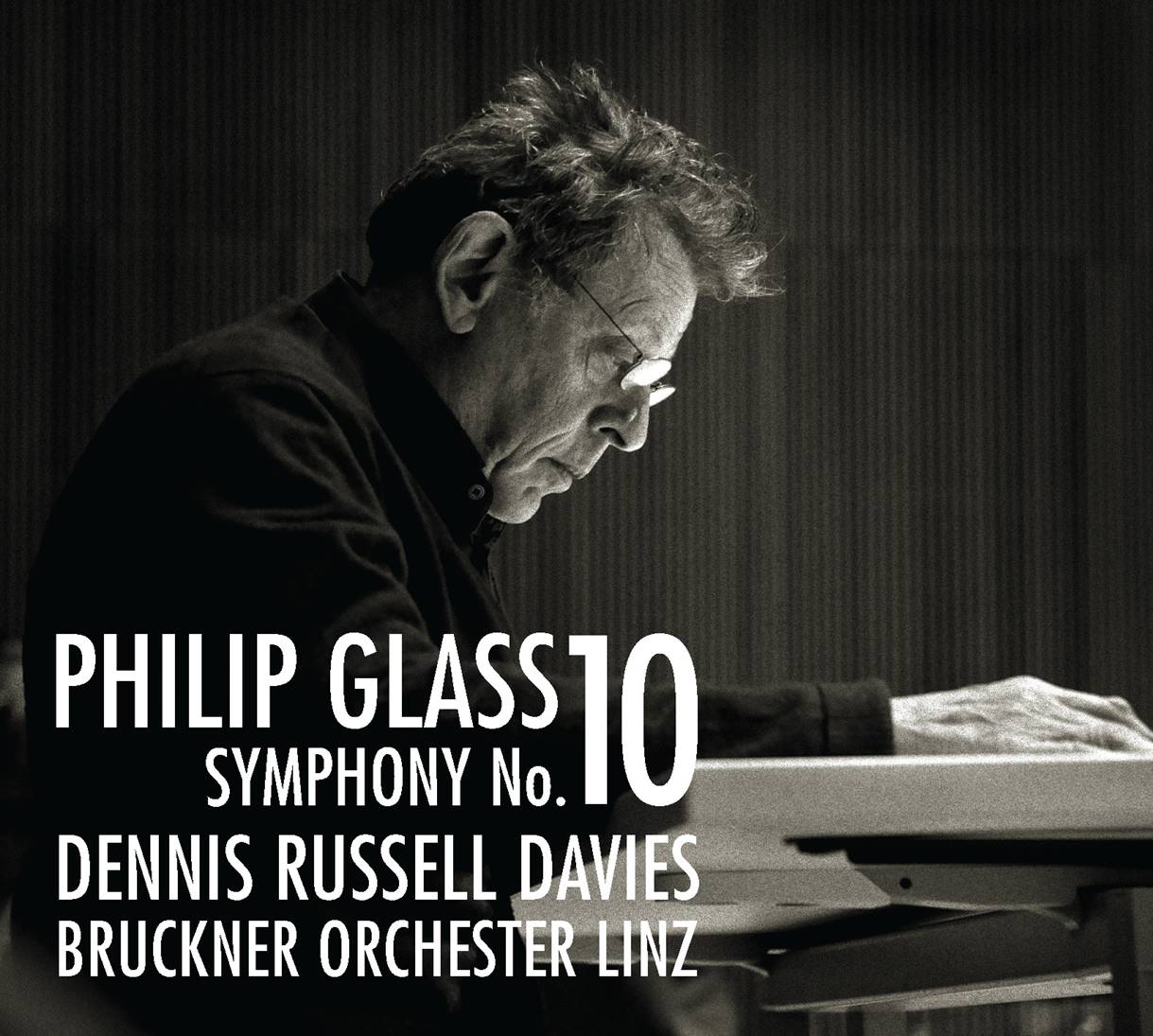
DENNIS RUSSELL DAVIES, CONDUCTOR
Catalog
UPC 801837010121
Tracks
2. Movement II 8:27
3. Movement III 5:41
4. Movement IV 6:17
5. Movement V 6:23
6. Concert Overture (2012) 7:53
Notes
The work premiered on August 9, 2012 at the Grand Théatre de Provence in Aix-en-Provence, France by the Orchestre Français des Jeunes, conducted by Dennis Russell Davies.
Symphony No. 10
The genesis of Symphony No. 10 is an interesting one and unlike any of the symphonies by Philip Glass. In one way, this 35-minute work premiered September 14, 2008 as a work called “Los Paisajes del Rio,” written for the 2008 Expo Zaragoza Spain as the closing ceremony fireworks show and performed by the Philip Glass Ensemble in what remains the last piece written for Glass’s own group which started 40 years earlier. In 2011, Glass orchestrated his fireworks for two principal reasons: firstly, the one-off performance in Zaragoza, while it was a fun and festive environment in which over 200,000 people gathered along the river, the piece was practically doomed to never be played again. “Paisajes” was not a good fit into the already extensive touring repertoire of the Philip Glass Ensemble and its instrumentation of keyboards, woodwinds and voice is a very uncommon instrumentation for other groups to pick up the work. Glass perceived that there was a real need to find other means to get this piece to the general public.
So Glass set about orchestrating the work for full symphony orchestra. This process had a precedent. In the case of Glass’s opera La Belle et la Bête, he composed the opera first for the PGE instrumentation then prepared an orchestral version for traditional operatic forces (a different experience from the PGE live-to-film version). Regarding the conceptualization of the piece as a symphony, Glass stated, “The reason composers re-use pieces is not because they run out of ideas. The reason is because you have a good piece buried in a piece of music that no one is ever going to play. How can I get this piece so that people will be able to hear it? You have to put it in a new format. I’d say that this music was saved from sure oblivion by putting it into this symphony.”
The work had stayed in Glass’s consciousness as something he hoped to find an occasion for. In discussing the process Glass stated, “When I go from the ensemble to the orchestra everything changes. The original material wasn’t adequately expressed in the ensemble alone. I needed to have more instruments. It was underscored. When I thought of it in a symphonic sense I said, now that material can have a proper setting.”
Unlike most of the Glass symphonies, Symphony No. 10 was not commissioned in the traditional manner. Something of a trial for the viability of his idea of adapting this music to big orchestra happened in summer 2011 when Glass orchestrated what was to become the last movement of the Tenth Symphony as a gift to the Cabrillo Festival of Contemporary Music in California that was celebrating its music director Marin Alsop’s 20th season at the festival. The movement was premiered under the name “Black & White Scherzo” on August 5, 2011 at the Santa Cruz Civic Auditorium performed by the Cabrillo Festival Orchestra.
The voyage to completion of this symphony was underway. The piece had begun the transformation from a “one-off” occasion piece, drowned out by fireworks, and the cacophony of 200,000 drunk revelers, to Glass’s hope of salvaging the music, to the proven viability of its final movement confirmed by the enthusiastic audience in Santa Cruz. “Still”, Glass said, “No one had asked for Symphony No.10.” Soon thereafter, that changed.
Dennis Russell Davies, who perhaps remains not only the catalyst and champion for this entire body of symphonic work, he who has commissioned nine of the ten symphonies, found a perfect outlet for this piece. Davies had begun leading the Orchestre Français des Jeunes (The French Youth Orchestra) and after discussing it with Glass came to conclusion that this was the ensemble with which Symphony No.10 should be created. Glass had a piece and Davies had orchestra. The OFJ commissioned the work and it premiered in France, now titled Symphony No.10, on August 9th, 2012 – Grand Theatre de Provence, Aix-en-Provence, with performances soon following in Paris at the Salle Pleyel, the London Proms with the Aurora Orchestra under Nicholas Collon, and the US premiere at the Cabrillo Festival in California under Brad Lubman.
Concert Overture (2012)
Perhaps the most well known overture ever composed is Tchaikovsky’s “1812 0verture.” Responding to a commission from the Toronto Symphony and the Baltimore Symphony (Glass’s hometown orchestra) to commemorate the bicentennial of the War of 1812. The piece had a double premiere on June 17, 2012 in Baltimore under Marin Alsop and in Toronto under Peter Oundjian. Acknowledging the Tchaikovsky overture, Glass called his new piece “An homage to the Tchaikovsky. The Tchaikovsky overture is a great masterpiece. What I was looking for is a kind of energy found in the Tchaikovsky, a kind of sweeping flow of music. The Tchaikovsky is a celebration of an event. This (my overture) is a celebration of a celebration.” Dennis Russell Davies took up the piece in 2013 with the Base Sinfonieorchester playing the new work in Switzerland and on tour in the United Kingdom, as well as performing the work with the Bruckner Orchester Linz where this recording was made.
-Richard Guerin 2015
Credits
Recorded by Signal2Noize | AudioVisualDesign
Recorded at Musiktheater Volksgarten – Orchestraal on September 3 and 5, 2013
Mastered by Michael Riesman
OMM CD produced by Don Christensen and Richard Guérin
Executive Producers for the Upper Austrian Theater and Orchestra GmbH: Dr. Thomas Königstorfer and Dr. Heribert Schröder
Philip Glass’s music is published by Dunvagen Music Publishers, Inc.
Executive Producers for Orange Mountain Music: Philip Glass, Kurt Munkacsi and Don Christensen
